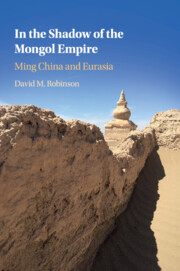Crossref Citations
This Book has been
cited by the following publications. This list is generated based on data provided by Crossref.
Robinson, David M.
2019.
Ming China and its Allies.
Song, Jaeyoon
2020.
Share and Rule: Intellectual Origins of the Early Ming (1368–1644) Princedoms.
Ming Studies,
Vol. 2020,
Issue. 81,
p.
28.
Biran, Michal
2021.
The Limits of Universal Rule.
p.
220.
Robinson, David M.
2021.
The Limits of Universal Rule.
p.
284.
Molnar, Aaron
2021.
More than the Great Wall: The Northern Frontier and Ming National Security, 1368-1644.
Ming Studies,
Vol. 2021,
Issue. 84,
p.
65.
Han, Xu
and
Yan, Xuanjun
2021.
Predicament of the Hongwu Emperor and his Defense for the Regime’s Legitimacy.
Ming Studies,
Vol. 2021,
Issue. 84,
p.
29.
Rossabi, Morris
2023.
The Cambridge History of the Mongol Empire.
p.
657.
Iiyama, Tomoyasu
2024.
The Emergence of the Yuan Non-Han Ancestry in Late Qing North China.
Journal of Chinese History,
Vol. 8,
Issue. 2,
p.
351.
Yülek, Murat Ali
and
Gür, Betül
2024.
MOĞOL İSTİLASININ ANADOLU EKONOMİSİNE ETKİLERİ: ANADOLU’DA SELÇUKLU BARIŞI’NI MOĞOL BARIŞI MI ORTADAN KALDIRDI?.
Stratejik ve Sosyal Araştırmalar Dergisi,
Vol. 8,
Issue. 1,
p.
1.
Molnar, Aaron
2024.
Korea and the Fall of the Mongol Empire: Alliance, Upheaval, and the Rise of a New East Asian Order By David Robinson. Cambridge University Press, 2022. 327 pages. Hardback, £56.40 GBP, ISBN: 9781009098960. Ebook, £75.00, ISBN: 9781009116794..
International Journal of Asian Studies,
Vol. 21,
Issue. 2,
p.
400.
Biran, Michal
and
Landa, Ishayahu
2025.
The Chinggisid Crisis of the mid-fourteenth century: reasons and consequences.
Journal of the Royal Asiatic Society,
Vol. 35,
Issue. 1,
p.
1.
Rossabi, Morris
2025.
Communications and “Communicators” in the Yuan and Early Ming.
Journal of Chinese History,
p.
1.
Omorov, Aitmamat
Chokoeva, Dilbar
Kalchakeyev, Kubanychbek
Sheripbayev, Amangeldi
and
Kochorova, Gulumkan
2025.
Interaction of Linguistic and Literary Aspects in the Context of the Cultural Diversity of the Turkic Peoples of Central Asia.
Open Cultural Studies,
Vol. 9,
Issue. 1,
Yang, Qiao
2025.
Lesser elite in crisis: family strategies of divination (yinyang) school instructors in the Yuan–Ming transition.
Journal of the Royal Asiatic Society,
Vol. 35,
Issue. 1,
p.
97.
Hope, Michael
2025.
An ulus within an ulus: the afterlife of Ariq Böke's appanage in the Mongol Empire (1252–1336).
Bulletin of the School of Oriental and African Studies,
p.
1.



